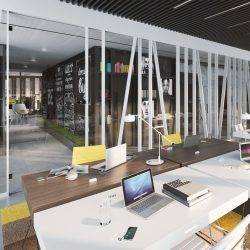November 13, 2017
Nine out of ten employees believe flexible working is key to boosting productivity
 Data published by HSBC claims that flexible and remote working practices are more likely than financial incentives to motivate staff and ultimately increase workplace productivity. A study of British businesses and employees found that nine in ten employees surveyed (89 percent) consider flexible working to be a key motivator to their productivity levels within the workplace – a view shared equally among male and female employees (87 percent and 90 percent respectively) – and more so than financial incentives (77 percent). Alongside this, 81 percent of workers who can work remotely believe this opportunity helps them to improve their productivity, making a clear link between flexible working cultures and increased business productivity levels.
Data published by HSBC claims that flexible and remote working practices are more likely than financial incentives to motivate staff and ultimately increase workplace productivity. A study of British businesses and employees found that nine in ten employees surveyed (89 percent) consider flexible working to be a key motivator to their productivity levels within the workplace – a view shared equally among male and female employees (87 percent and 90 percent respectively) – and more so than financial incentives (77 percent). Alongside this, 81 percent of workers who can work remotely believe this opportunity helps them to improve their productivity, making a clear link between flexible working cultures and increased business productivity levels.









 Most private sector workers are still not pushing for pay rises, despite falling real wages and low unemployment, according to the latest quarterly CIPD/The Adecco Group Labour Market Outlook survey. Only a quarter (24 percent) of employers in the private sector say they are under some or significant pressure to raise wages from the majority of their workforce, while almost four in ten private sector firms (38 percent) say they face no pressure at all to raise wages. The most common reason given by private sector employers (23 percent) for the lack of pressure to raise wages is a recognition among workers that the business cannot afford more generous pay increases, underlining the productivity challenge many firms face. The survey of more than 2,000 UK employers shows a slightly higher proportion of private sector employers (36 percent) cite either some or significant pay pressure to raise wages for certain roles, particularly among high and middle-skilled jobs.
Most private sector workers are still not pushing for pay rises, despite falling real wages and low unemployment, according to the latest quarterly CIPD/The Adecco Group Labour Market Outlook survey. Only a quarter (24 percent) of employers in the private sector say they are under some or significant pressure to raise wages from the majority of their workforce, while almost four in ten private sector firms (38 percent) say they face no pressure at all to raise wages. The most common reason given by private sector employers (23 percent) for the lack of pressure to raise wages is a recognition among workers that the business cannot afford more generous pay increases, underlining the productivity challenge many firms face. The survey of more than 2,000 UK employers shows a slightly higher proportion of private sector employers (36 percent) cite either some or significant pay pressure to raise wages for certain roles, particularly among high and middle-skilled jobs.


 There are ongoing dual narratives in UK economy caused by the 2016 Brexit vote, the latest Morgan McKinley October Employment Monitor suggests. On the one hand, a new report by Colliers International dubbed London Europe’s top economic City. On the other hand, institutions are stubbornly stuck in limbo, and the fear of major jobs losses looms thick in the sky, keeping hiring low. “The economic tug of war that Brexit kicked off means we still have no idea quite where we’ll land,” said Hakan Enver, Operations Director, Morgan McKinley Financial Services. October was the lowest jobs month of 2017, a possible indication that the closing months of the year will be especially quiet. Job seekers increased by 6 percent month-on-month, but were down just under 40 percent year-on-year. The trajectories are in line with the overall dual trends of 2017. Jobs available were down 14 percent month-on-month and 20 percent year-on-year. Given the underlying health of the economy, Brexit looks to be the main culprit for the job market attrition.
There are ongoing dual narratives in UK economy caused by the 2016 Brexit vote, the latest Morgan McKinley October Employment Monitor suggests. On the one hand, a new report by Colliers International dubbed London Europe’s top economic City. On the other hand, institutions are stubbornly stuck in limbo, and the fear of major jobs losses looms thick in the sky, keeping hiring low. “The economic tug of war that Brexit kicked off means we still have no idea quite where we’ll land,” said Hakan Enver, Operations Director, Morgan McKinley Financial Services. October was the lowest jobs month of 2017, a possible indication that the closing months of the year will be especially quiet. Job seekers increased by 6 percent month-on-month, but were down just under 40 percent year-on-year. The trajectories are in line with the overall dual trends of 2017. Jobs available were down 14 percent month-on-month and 20 percent year-on-year. Given the underlying health of the economy, Brexit looks to be the main culprit for the job market attrition.
 Office rents have begun to slip across Central London, and the chief reasons could be uncertainty around the outcome of the Brexit talks and the UK seemingly missing out on the rising level of global trade, suggests Cluttons’ London Office Market Bulletin Autumn 2017. While the report highlights that many locations in Central London have seen headline office rents hold steady for the better part of two years, rent free periods have been moving out in order to sustain this, but now appear to be at a critical tipping point, level, which is driving some landlords to consider alternative incentives, such as delayed completions. Freddie Pritchard-Smith, Head of commercial office agency at Cluttons said: “Many firms remain nervous about making a long-term commitment to more space, choosing either flexible overflow space or to reconfigure within their existing office. The exception to this of course remains the serviced office and TMT sectors, who have helped transactional levels in the West End to surpass 4 million sq ft already this year, which is paradoxical to the falling rental conditions.”
Office rents have begun to slip across Central London, and the chief reasons could be uncertainty around the outcome of the Brexit talks and the UK seemingly missing out on the rising level of global trade, suggests Cluttons’ London Office Market Bulletin Autumn 2017. While the report highlights that many locations in Central London have seen headline office rents hold steady for the better part of two years, rent free periods have been moving out in order to sustain this, but now appear to be at a critical tipping point, level, which is driving some landlords to consider alternative incentives, such as delayed completions. Freddie Pritchard-Smith, Head of commercial office agency at Cluttons said: “Many firms remain nervous about making a long-term commitment to more space, choosing either flexible overflow space or to reconfigure within their existing office. The exception to this of course remains the serviced office and TMT sectors, who have helped transactional levels in the West End to surpass 4 million sq ft already this year, which is paradoxical to the falling rental conditions.”


 Over half (52 percent) of people who work remotely feel their colleagues don’t treat them equally, claims a new study. Working remotely has become a highly sought-after job perk and having the flexibility to live and work where you please, regardless of corporate headquarters, often draws people to take one job over another. But a survey from VitalSmarts produced by David Maxfield and Joseph Grenny, authors of the bestsellers Crucial conversations and Crucial Accountability, found that remote employees have a significantly harder time with a number of workplace challenges than their onsite colleagues. 67 percent of remote employees complained that colleagues didn’t fight for their priorities compared 59 percent of onsite employees. 41 percent of remote employees believed colleagues say bad things about them behind their back compared to 31 percent of onsite employees and 64 percent of remote employees had changes made to a project without warning vs. 58 percent of onsite employees. Over a third (35 percent) of remote employees thought colleagues were lobbying against them vs. 26 percent of onsite employees.
Over half (52 percent) of people who work remotely feel their colleagues don’t treat them equally, claims a new study. Working remotely has become a highly sought-after job perk and having the flexibility to live and work where you please, regardless of corporate headquarters, often draws people to take one job over another. But a survey from VitalSmarts produced by David Maxfield and Joseph Grenny, authors of the bestsellers Crucial conversations and Crucial Accountability, found that remote employees have a significantly harder time with a number of workplace challenges than their onsite colleagues. 67 percent of remote employees complained that colleagues didn’t fight for their priorities compared 59 percent of onsite employees. 41 percent of remote employees believed colleagues say bad things about them behind their back compared to 31 percent of onsite employees and 64 percent of remote employees had changes made to a project without warning vs. 58 percent of onsite employees. Over a third (35 percent) of remote employees thought colleagues were lobbying against them vs. 26 percent of onsite employees.















November 9, 2017
Review: ushering in a new era for the coworking phenomenon 0
by Paul Carder • Comment, Coworking, Technology, Work&Place, Workplace design
More →